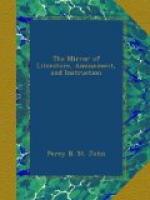Korner is one of the poets of whom modern Germany is justly proud. His was not the mere theoretic heroism which contents itself with celebrating the deeds of others. His own conduct embodied the most noble conceptions of his imagination, and his life and death exhibited a splendid example of the patriotism which breathed throughout his verse. He was born at Dresden in 1791. His education was of the most careful kind. He was not only instructed in various branches of learning, but the elegant accomplishments of the fine arts were added, and the exercises of the body were not less attended to than those of the mind. Called upon to choose some occupation, he determined to apply himself to mining, and took up his residence at Vienna, where he enjoyed the advantage of a familiar intercourse with William Von Humboldt, the Prussian ambassador, Frederic Schlegel, and other eminent literary and scientific men. Here, within the short space of fifteen months, he produced a rapid succession of dramas, operas, and farces, as well as several small poems. The success of his works obtained him the appointment of poet to the court. He was now in the enjoyment of all that could render life happy—competence, distinction, esteem, friendship and love; but he resolved to sacrifice them all “for that greatest mortal blessing, his country’s freedom.”
“Could I,” says he, in a letter to his father, “could I, think you, stand aloof, contented to celebrate with weak inspiration the success of my conquering brethren? I am aware that you will suffer much anxiety,—My mother too will weep—may God be her comfort!—I cannot spare you this trial. That I simply offer my life is of little import; but that I offer it, crowned as it is with all the flowery wreaths of love, of friendship, and of joy,—that I cast away the sweet sensations which lived in the conviction that I have caused you no inquietude, no anguish,—this indeed is a sacrifice which can only be opposed to such a prize!”
He left Vienna in March 1813, and joined the free corps which Major Von Lutzow was then forming. This was a voluntary association, and the corps was remarkable throughout the war for its valour and enterprise. In the midst of the most active campaigns, Korner continued to pour forth his verses. Other poets have written of battles in the retirement of the closet, but he sang his song of war on the tented field, and amid the din of conflict. Nor was this all: he collected too the strains of other poets, and adapted them to appropriate airs, to animate the ardour of his companions in arms. We cannot follow him through his career, brief as it was; but the subjoined incident is too striking to be omitted, and is especially adapted to our purpose, as it affords an opportunity of giving a passage of his unpremeditated verse in a moment of pain and danger.
On the 28th of May, Major Von Lutzow had determined on setting out on an expedition towards Thuringia, with four squadrons of his cavalry, and fifty cossacks. Korner earnestly entreated permission to accompany him, and his desire was fulfilled by his being appointed adjutant by Major Von Lutzow, who highly esteemed him, and wished to have him near his person.




